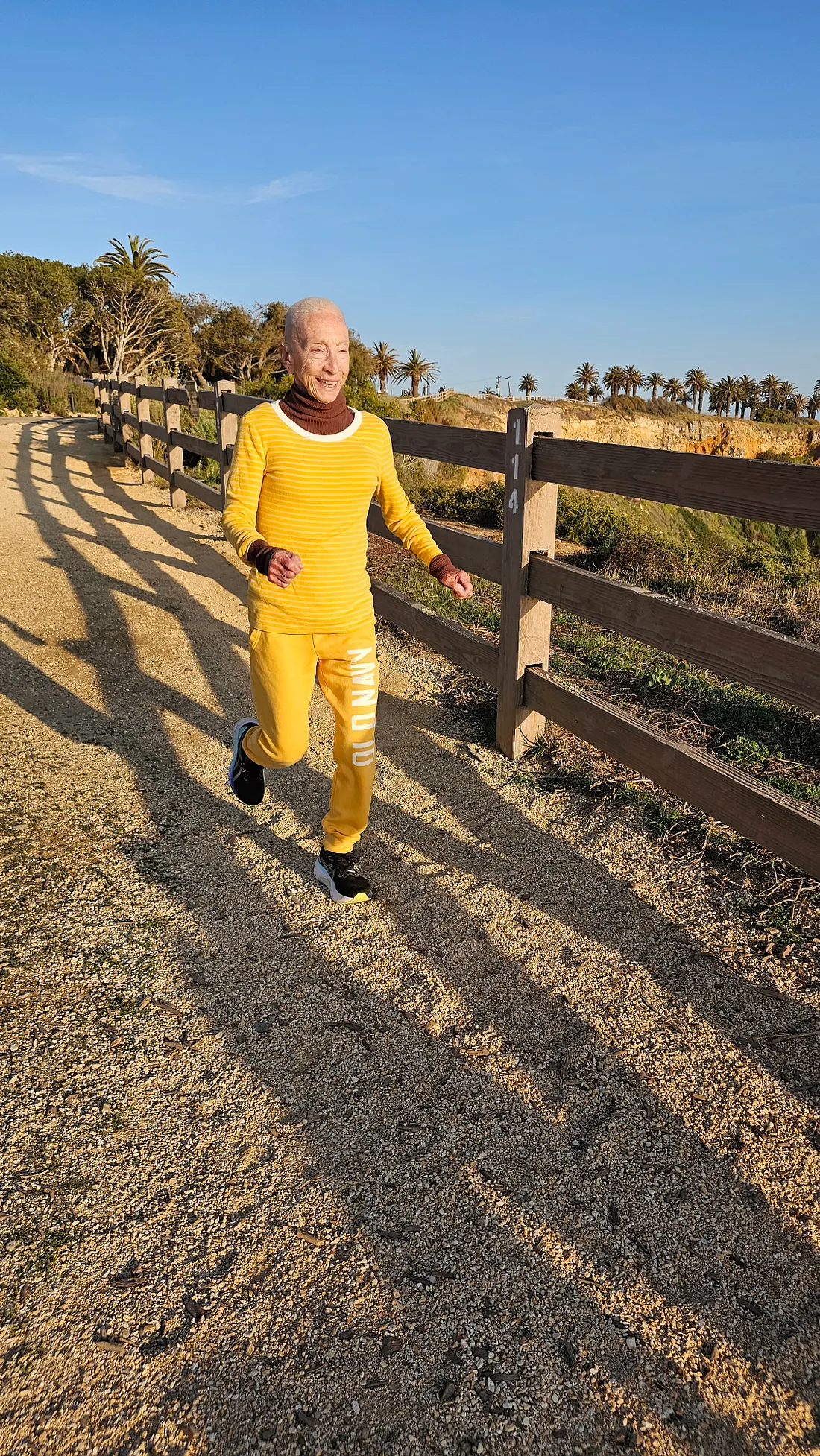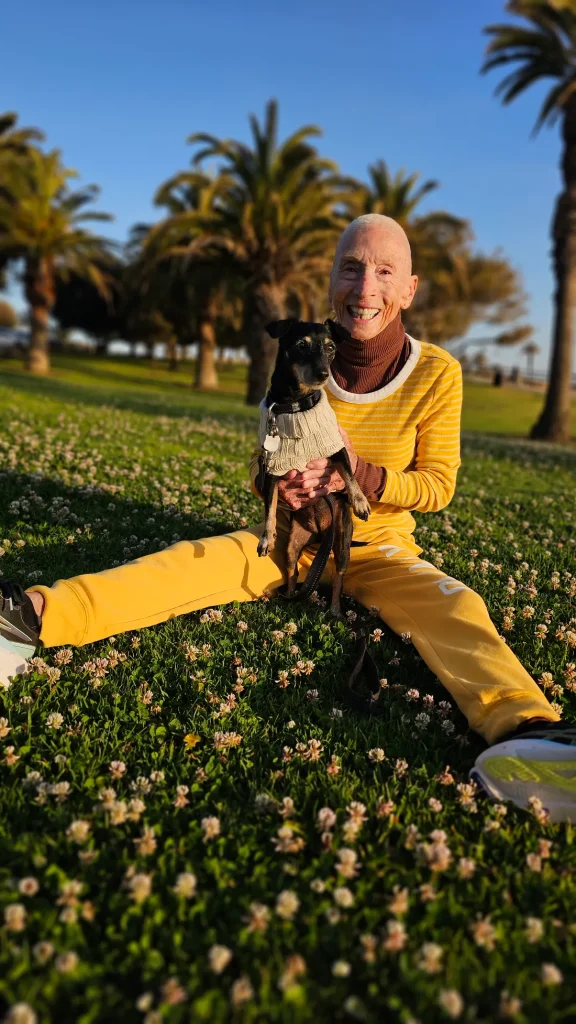Bonnie Frankel On How To Slow Down To Do More

Give Yourself Grace — In order to slow down to live more intentionally, I desire to be honest about my limitations to allow myself grace to just do what I can do. There is an abundance of freedom that can be found in just accepting what I am able to do. Taking a few minutes to breathe, be truthful with myself about what I can do and give permission to do just that.
Asa part of our series about “How to Slow Down To Do More” I had the pleasure to interview Bonnie Frankel.
Bonnie is famous for her infectious enthusiasm. Exercise decluttered her stuff to get her priorities in order. Implementing mindfulness with exercise assisted her to connect the importance of, “Stop and smell a rose,” implementing interval training.
Thank you so much for doing this interview with us! Can you tell us the “backstory” about what brought you to this specific career path?
Exploring a running class coached by Tommie Smith unexpectedly revealed the beginning of a new chapter implementing a spring in my step. The exercise assisted my learning disabilities plus the ability to focus on the present moment. The mental and emotional transition performing in athletics surprisingly shifted the direction of my career reflecting a picture of wellness.
According to a 2006 Pew Research Report report, 26% of women and 21% of men feel that they are “always rushed”. Has it always been this way? Can you give a few reasons regarding what you think causes this prevalent feeling of being rushed?
“The more things change, the more they remain the same.” Racing through life is connected to the way we are physiologically preprogrammed by three chemicals: cortisol, adrenaline, and norepinephrine. We become addicted to the released chemicals by craving the feelings they create. The fast-paced lifestyle and societal pressures add to the impact of the hurried state. The frequent feeling of time being accelerated can also be referred to as “hurry sickness.” The rushing induces stress and anxiety due to the need to make the most out of every moment. The feeling of instability and uncertainty in today’s world doesn’t hearten us to set priorities/boundaries, eliminate divisiveness, attain virtuous government leadership, and rekindle democracy. Experiencing life in the fast lane is induced by the complication of factors that specifically relate to cultural expectations that value productivity, the demands of modern life and technology, and personal choices that lead us to transgress our boundaries. People are restless due to the distorted information the media paints, the corrupt government leadership, cyberterrorism, and loved ones becoming seriously ill due to the covid pandemic. There are those of us who link ourselves to the sense of perfection and control. The belief that the ability to control everything, or create perfection, feeds the feeling of the need to be a step ahead, as opposed to being in the present moment. Rushing is rooted in our evolutionary need for survival.
Based on your experience or research can you explain why being rushed can harm our productivity, health, and happiness?
We become dependent from the extended height the rush syndrome produces physiologically from the chemicals leading to various negative health effects that prey on the body and mind. The side effects create chronic stress syndrome from increased stress hormones, anxiety, digestive issues, sleep disturbances, and an overall weakened immune system creating an unhealthy spirit. The dispirited initiates the state of, “fight-or-flight,” only to make poor decisions/ performances. An overload of rush can induce negative health effects which include increased blood pressure, heart problems, and even brain damage. The relentless pursuit of fleeting pleasures or the constant pressure to achieve a certain level of happiness can create a sense of being overwhelmed. Your brain can trick you.
On the flip side, can you give examples of how we can do more, and how our lives would improve if we could slow down?
If we choose to focus on the present moment, it authorizes us to appreciate the finer details of life, feel more in control, and reduce anxiety levels to attain joyful peace. In essence, it enables us to be a better person with the ability to make pristine decisions and enjoy healthier personal/work relationships. We would champion the process, which would not only better our performance but would abstractly touch something that we would never have thought to benefit from at another level. The goal isn’t as important as the process as we delve deeper. Don’t hurry, slow down because when we initiate intervals in our speediness, it enables us to focus on the present moment which authorizes us to appreciate the finer details of life, limits anxiety, feel more in charge, which leads to a sense of going through the process of accomplishment with a joyful state of mind. By slowing down, we significantly improve our lives by fostering mental well-being, adopting better relationships, and boosts our productivity. We focus on mindful living which deepens the appreciation of everyday activities, increasing happiness and reducing stress.

We all live in a world with many deadlines and incessant demands for our time and attention. That inevitably makes us feel rushed. Can you share with our readers five strategies that you use to “slow down to do more”? Can you please give a story or example for each?
- Practice Mindfulness — This useful technique can influence the perception of time, creating the feeling of time is slowing down. It initiates my mind to be fully in the present moment which allows me to become acutely aware of the details of the experience. This leads to the impact of time passing more slowly. The consciousness cultivates a greater awareness of the present, giving me the opportunity to savor and appreciate details that could otherwise go unnoticed. I use mindfulness when I run on the trails surrounded by nature, implementing intervals. It equalizes the three chemicals so that I feel centered.
- Exercise Gratitude — By engaging in real -time pulls me back into the present and creates the awareness of the goodness I am blessed with in each moment. When sensing my inner voice persuading me to “hurry up,” this is the cue to physically show down or just stop. Sometimes it can take twenty seconds or so for me to think of something I can be grateful for on the moment, and then my perspective and priorities shift.
- Outdoors — Engaging in an exercise I enjoy because it opens -up the brain and allows it to wander. Some of my best brainstorming and thinking happens when I go for a walk or a slow jog. The feeling of the sun on my face and listening to the wind in the trees puts everything in perspective as it calms the frenetic pace I need to follow. I also engage in intervals when running, because it creates the feeling to train the three chemicals that push my buttons to slow down.
- Give Yourself Grace — In order to slow down to live more intentionally, I desire to be honest about my limitations to allow myself grace to just do what I can do. There is an abundance of freedom that can be found in just accepting what I am able to do. Taking a few minutes to breathe, be truthful with myself about what I can do and give permission to do just that.
- Avoid Shortcuts — By implementing this concept has challenged my patience, but I know by practicing self-discipline is imperative to intentional living. Choosing to do something the long way instead of sprinting, I prioritize hard work, perseverance, and dedication in the pursuit of the goals. It also prevents accidents, injuries, and poor quality of work. It assists me to avoid distractions and procrastination and spotlights the most important and urgent tasks. When I avoid instant gratification, I cut my risks. The process of my success in changing the NCAA rule was a lengthy process and it was worth the wait.
How do you define “mindfulness”? Can you give an example or story?
The exercise of the mind to live in the present moment supports awareness of the current experience which prevents us from scattering our thoughts leading to taking on too many exercises. It can be cultivated through the practices of being seated, laying down, standing, walking or any form of movement. When I am exercising in the pool against the natural resistance of the water, it gently forces my breath to deepen and concentrate in the present moment, allowing my mind to quiet my nerves. It also fosters resilience and enables a greater sense of inner strength. Often “connecting the dots,” process crucial for problem-solving and making informed decisions.
Can you give examples of how people can integrate mindfulness into their everyday lives?
Focusing on the present moment prompts you to pay attention to your senses and observe your thoughts and feelings without judgment. The practice of simple exercises: mindful breathing, focusing on sensations during activities with physical exercise, eating, active listening, guided imagery, and various pursuits. Regular practice will cultivate a greater sense of presence and well-being.
Do you have any mindfulness tools that you find most helpful at work?
Body scan meditation where you bring awareness to different parts of your body which can help with physical and mental relaxation preventing you from being overwhelmed. Cultivating gratitude, and mindful listening can be integrated into daily routines to cultivate a calmer and more focused work environment. Decluttering your workplace will improve your ability to single-task. Encourage breaks where you can meditate. Incorporate mindful breathing exercises into meetings and create designated quiet spaces for reflection.
What are your favorite books, podcasts, or resources that inspire you to use mindfulness tools or practices?
Yoga and Tai Chi are helpful exercises as they develop my awareness of the breath by incorporating elements of a slow mindful movement, which cultivates present movement awareness, slows down the hurried syndrome, and reduces stress. Engaging in an exercise I love to do will also pivot my attention to being in the here and now moment by integrating intervals Surrounding yourself with nature provides a rich sensory experience and a sense of spaciousness that can help to ground and center me in the present moment. The apps. including Headspace and Calm are guided meditations and sleep stories. My longtime favorite must be Eckhart Tolle’s books and his audio recordings. The websites such as mindful.org and The Greater Good Science Center provide various articles, courses, and directories on mindfulness which are most helpful as well as connecting with others.
Can you please give us your favorite “Life Lesson Quote”? Can you share how that was relevant to you in your life?
“Do less, better,” Marcus Aurelius. When I am feeling overwhelmed, it gently reminds me to focus on the essential tasks. By eliminating inessential actions, I dedicate my time and energy to what truly matters which leads to greater satisfaction and tranquility. When I began a new chapter in my life, the change overwhelmed me where I froze and couldn’t move forward. This quote admonished that feeling, and I was able to prioritize my tasks.
You are a person of great influence. If you could inspire a movement that would bring the most amount of good to the most amount of people, what would that be? You never know what your idea can trigger. 🙂
Slow down, avoid shortcuts.
Thank you so much for these insights! This was so inspiring!
